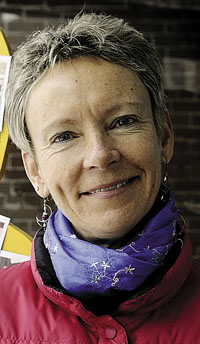WATERVILLE — City officials said Tuesday that Waterville would lose $1.7 million if Gov. Paul LePage’s proposal to suspend state revenue sharing temporarily goes into effect.
While Mayor Karen Heck told city councilors she doubts the revenue sharing cut will happen, she reiterated her belief that the state’s 7 percent lodging tax should be increased as a way to generate revenue for Maine.
She called Maine a “cheap date” when it comes to lodging, as the state’s rate is less than that of all other New England states, as well as Florida.
On Monday, she said no one is going to stop coming to Maine if the lodging tax rate is equal to that of other states.
“I know how fond the governor is of Florida and some of the things they do,” Heck said, “and I’m hoping he’ll take a page out of their book and have a similar lodging tax, which down there is 15 percent.”
Florida’s lodging tax rate is complicated, and the amount one pays varies depending on area.
An official at the Florida Revenue Department said Tuesday that a person who rents a hotel room there is subject to Florida’s 6 percent sales tax, plus any discretionary local option and tourist development taxes, which vary from country to county.
Some states, such as Maine, have an across-the-board 7 percent tax rate for lodging; but some states have a general tax and authorize local communities and counties to levy an additional local option tax.
To rent a hotel room in Rhode Island, one pays a hotel tax of 6 percent in addition to a 7 percent sales tax, for a total of 13 percent.
The lodging tax rate in Massachusetts is a general state tax of 5.7 percent, and cities or towns may add an additional occupancy tax of up to 6 percent. In Connecticut, the tax is 15 percent for the first 30 days. In Vermont, the tax rate is 9 percent, with a local option of adding 1 percent more; and in New Hampshire, the lodging tax rate is 9 percent across the board.
Heck said Waterville in 2008 got $2.9 million in revenue sharing from the state, and last year it got about $1.6 million, about $880,000 less.
She said she thinks residents want their roads fixed, schools up to par and police and fire to respond when needed, and the city uses revenue sharing to help pay for those services.
She said people need to start talking about how to fairly assess taxes and whether Maine is going to be the “cheap date” that it is, with such a low lodging tax rate.
“I’m happy to talk about this,” she said. People talk to me all the time about taxes.”
No one responded, but when the council was asked later to approve borrowing $5.8 million for capital improvements, Councilor John O’Donnell, D-Ward 5, objected.
He said the city probably is looking at a tax hike for the third year in a row, the city’s fund balance is at its minimum ($6 million) and the governor is proposing taking $1.7 million in revenue sharing.
The council is committed to borrowing $5.3 million for approved capital improvement projects including the police station, public works equipment and road construction projects, but recently “cherry-picked” another $500,000 worth of projects to add to that amount, he said.
Those items include equipment for the airport and $200,000 for Drummond Avenue repair.
In light of the city’s financial status, that $500,000 should be taken out of the borrowing proposal, according to O’Donnell.
“I think we’ve got to put the cherry-picked $500,000 items back,” he said. “I can’t support the $5.8 million bond.”
He was the lone dissenter in the 6-1 vote to approve that bond.
Councilor Fred Stubbert, D-Ward 1, said he agreed with O’Donnell, but costs for projects will only go up, and now is a good time to do them as money is cheap.
“I understand money is cheap, but there is a limit,” O’Donnell retorted.
Council Chairman Erik Thomas, D-Ward 4, said $200,000 of the $500,000 O’Donnell referred to is for road repair and the money will be matched by the state. But O’Donnell said the road to be fixed is a state road and the state’s responsibility.
The city has agreed to share the cost to repair the road, as the state has said it can’t afford to do it alone. O’Donnell wasn’t buying the state’s stance.
“It’s a gimmick,” he said.
Amy Calder — 861-9247
acalder@centralmaine.com
Send questions/comments to the editors.



